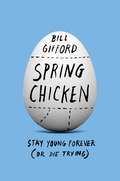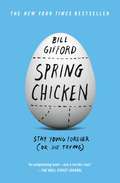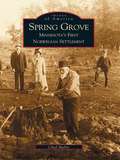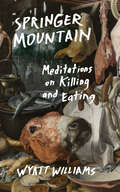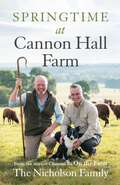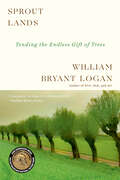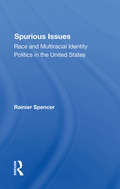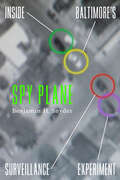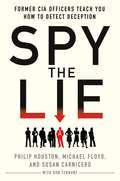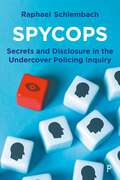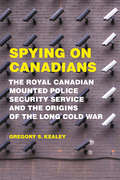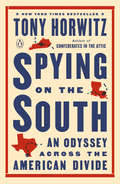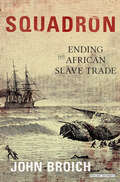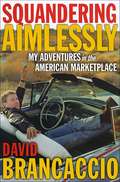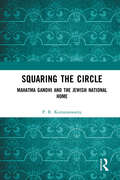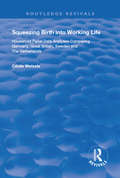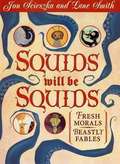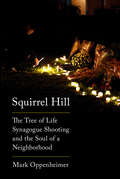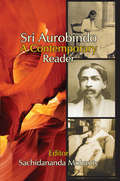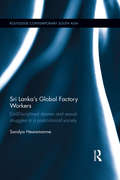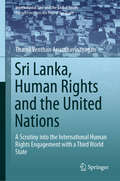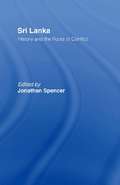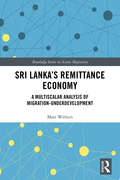- Table View
- List View
Spring Chicken: Stay Young Forever (or Die Trying)
by Bill GiffordFrom acclaimed journalist Bill Gifford comes a roaring journey into the world of anti-aging science in search of answers to a universal obsession: what can be done about getting old?<P><P> SPRING CHICKEN is a full-throttle, high-energy ride through the latest research, popular mythology, and ancient wisdom on mankind's oldest obsession: How can we live longer? And better? In his funny, self-deprecating voice, veteran reporter Bill Gifford takes readers on a fascinating journey through the science of aging, from the obvious signs like wrinkles and baldness right down into the innermost workings of cells. We visit cutting-edge labs where scientists are working to "hack" the aging process, like purging "senescent" cells from mice to reverse the effects of aging. He'll reveal why some people live past 100 without even trying, what has happened with resveratrol, the "red wine pill" that made headlines a few years ago, how your fat tissue is trying to kill you, and how it's possible to unlock longevity-promoting pathways that are programmed into our very genes. Gifford separates the wheat from the chaff as he exposes hoaxes and scams foisted upon an aging society, and arms readers with the best possible advice on what to do, what not to do, and what life-changing treatments may be right around the corner.<P> An intoxicating mixture of deep reporting, fascinating science, and prescriptive takeaway, SPRING CHICKEN will reveal the extraordinary breakthroughs that may yet bring us eternal youth, while exposing dangerous deceptions that prey on the innocent and ignorant.
Spring Chicken: Stay Young Forever (or Die Trying)
by Bill GiffordFrom acclaimed journalist Bill Gifford comes a roaring journey into the world of anti-aging science in search of answers to a universal obsession: what can be done about getting old?SPRING CHICKEN:Stay Young Forever (or Die Trying)SPRING CHICKEN is a full-throttle, high-energy ride through the latest research, popular mythology, and ancient wisdom on mankind's oldest obsession: How can we live longer? And better? In his funny, self-deprecating voice, veteran reporter Bill Gifford takes readers on a fascinating journey through the science of aging, from the obvious signs like wrinkles and baldness right down into the innermost workings of cells. We visit cutting-edge labs where scientists are working to "hack" the aging process, like purging "senescent" cells from mice to reverse the effects of aging. He'll reveal why some people live past 100 without even trying, what has happened with resveratrol, the "red wine pill" that made headlines a few years ago, how your fat tissue is trying to kill you, and how it's possible to unlock longevity-promoting pathways that are programmed into our very genes. Gifford separates the wheat from the chaff as he exposes hoaxes and scams foisted upon an aging society, and arms readers with the best possible advice on what to do, what not to do, and what life-changing treatments may be right around the corner. An intoxicating mixture of deep reporting, fascinating science, and prescriptive takeaway, SPRING CHICKEN will reveal the extraordinary breakthroughs that may yet bring us eternal youth, while exposing dangerous deceptions that prey on the innocent and ignorant.
Spring Grove: Minnesota's First Norwegian Settlement
by Chad MullerSpring Grove: Minnesota's First Norwegian Settlement is a tribute to the state's earliest Norwegian emigrants, and to generations of Norwegian Americans who have made this small farming community amongst deep valleys, fjord-like bluffs, and winding streams their true vesterheim. It is a tale told through striking historic photographs, many previously unreleased, and personal narratives, often humorous and always insightful.The area was first settled in the 1850s by pioneers like James Smith, who, inspired by the landscape, named the place Spring Grove. Smith was followed by the likes of "Big" Ole Gulbransgutton, who chased crooked land surveyors out of town with his bare fist; by the innovative Mons Fladager, whose business acumen earned him the title of "Father of Spring Grove"; and by the 20th-century cartoonist Peter J. Rosendahl, whose work gave a comical voice to the challenges of cultural assimilation. Spring Grove: Minnesota's First Norwegian Settlement also conveys the universality of the Norwegian immigrant experience, and anyone with Norwegian roots who desires to learn more about their ancestors will find it an enjoyable read.
Springer Mountain: Meditations on Killing and Eating
by Wyatt WilliamsDrawing on years of investigative reporting, Wyatt Williams offers a powerful look at why we kill and eat animals. In order to understand why we eat meat, the restaurant critic and journalist investigated factory farms, learned to hunt game, worked on a slaughterhouse kill floor, and partook in Indigenous traditions of whale eating in Alaska. In Springer Mountain, he tells about his experiences while charting the history of meat eating and vegetarianism. Williams shows how mysteries springing up from everyday experiences can lead us into the big questions of life while examining the irreconcilable differences between humans and animals. Springer Mountain is a thought-provoking work, one that reveals how what we eat tells us who we are.
Springtime at Cannon Hall Farm
by The Nicholson FamilyThe instant no. 2 Sunday Times bestseller!Join the Nicholson family for this heartwarming journey through a typical springtime on their South Yorkshire farm.Throughout the book they reflect on the childhood stories, testing times, poignant memories and enriching experiences that have shaped the lives they lead today. With the coming of a new season, Roger and Cynthia Nicholson and their sons Richard, Robert and David show how the farming year is shaped around the arrival of baby goats, lambs, calves and piglets galore.As Yorkshire's premier open farm attraction, Cannon Hall Farm continues to play host to thousands of visitors and spring is the busiest time of the year. People flock to meet the new arrivals and catch up with old favourites such as the llama and alpaca posse, the stunning shire horses and the irrepressible Shetland ponies, including Ozzy Horsebourne and Jon Bon Pony.Along with all the animal antics, Springtime at Cannon Hall Farm features tales of bygone days when traditional skills, crafts and daily practices shaped life in the countryside. And for fans of Rob and Dave's Channel 5 shows, there are lots of behind-the-scenes secrets you won't want to miss...
Sprout Lands: Tending The Everlasting Gift Of Trees
by William Bryant LoganWinner of the 2021 John Burroughs Medal for Distinguished Natural History Writing "This deeply nourishing book invites us to reclaim reciprocity with the living world." —Robin Wall Kimmerer, author of Braiding Sweetgrass Once, farmers and rural people knew how to prune hazel to foster abundance: both of edible nuts and of straight, strong, flexible rods for bridges, walls, and baskets. Townspeople felled their beeches to make charcoal to fuel ironworks. Shipwrights shaped oaks to make hulls. No place could prosper without its inhabitants knowing how to cut their trees so they would sprout again. Pruning the trees didn’t destroy them. Rather, it created the healthiest, most sustainable and diverse woodlands that we have ever known. Arborist William Bryant Logan offers us both practical knowledge about how to live with trees to mutual benefit and hope that humans may again learn what the persistence and generosity of trees can teach. He recovers the lost tradition that sustained human life and culture for ten millennia.
Spurious Issues: Race And Multiracial Identity Politics In The United States
by Rainier SpencerThis book is an examination of multiracial identity politics in the United States and of the specific issues surrounding Office of Management and Budget's review—the parties concerned, the history of federal racial categorization, and the significance of the new rules on race in America.
Spy Plane: Inside Baltimore's Surveillance Experiment
by Benjamin H. SnyderAn exclusive behind-the-scenes look at one of America’s most controversial experiments in police surveillance. In 2020, the Baltimore Police Department had an aerial surveillance plane that could supposedly photograph and track every person in public view. Spy Plane reveals what happened with this controversial policing experiment. Drawing from incredible access and direct observations inside the for-profit tech startup that ran the program for Baltimore detectives, sociologist Benjamin H. Snyder recounts real criminal cases as they were worked by police using this untested tool. Deploying aircraft with powerful cameras built by a small company called Persistent Surveillance Systems, the spy plane program promised to help police "solve otherwise unsolvable crimes" by tracking the whereabouts of suspects in violent crime cases. Created for the battlefields of Iraq, it had never been adapted on so large a scale in a U.S. city. This riveting book gives an unprecedented look inside the shadowy world of for-profit law enforcement technology experiments, explaining why police and community leaders place so much faith in unproven technology to fix the problem of urban violence but continually come up short.
Spy The Lie: Former Cia Officers Teach You How To Detect Deception
by Philip Houston Michael Floyd Susan Carnicero Don TennantThree former CIA officers--among the world's foremost authorities on recognizing deceptive behavior--share their proven techniques for uncovering a lie Imagine how different your life would be if you could tell whether someone was lying or telling you the truth. Be it hiring a new employee, investing in a financial interest, speaking with your child about drugs, confronting your significant other about suspected infidelity, or even dating someone new, having the ability to unmask a lie can have far-reaching and even life-altering consequences. As former CIA officers, Philip Houston, Michael Floyd, and Susan Carnicero are among the world's best at recognizing deceptive behavior. Spy the Liechronicles the captivating story of how they used a methodology Houston developed to detect deception in the counterterrorism and criminal investigation realms, and shows how these techniques can be applied in our daily lives. Through fascinating anecdotes from their intelligence careers, the authors teach readers how to recognize deceptive behaviors, both verbal and nonverbal, that we all tend to display when we respond to questions untruthfully. For the first time, they share with the general public their methodology and their secrets to the art of asking questions that elicit the truth. Spy the Lie is a game-changer. You may never read another book that has a more dramatic impact on your career, your relationships, or your future.
Spycops: Secrets and Disclosure in the Undercover Policing Inquiry
by Raphael SchlembachThe ‘spycops’ scandal has laid bare the existence of secretive police units that sent undercover police officers to infiltrate and undermine hundreds of political campaigns and activist groups. This is the first academic analysis of the activists’ experiences and their attempts to find answers and accountability in the Undercover Policing Inquiry. Written from the perspective of the ‘policed’, the author draws on extensive fieldwork and his first-hand experience of police infiltration through his participation in climate campaigns.
Spying on Canadians: The Royal Canadian Mounted Police Security Service and the Origins of the Long Cold War
by Gregory S. KealeyAward winning author Gregory S. Kealey’s study of Canada’s security and intelligence community before the end of World War II depicts a nation caught up in the Red Scare in the aftermath of the Bolshevik Revolution and tangled up with the imperial interests of first the United Kingdom and then the United States. Spying on Canadians brings together over twenty five years of research and writing about political policing in Canada. Through itse use of the Dominion Police and later the RCMP, Canada repressed the labour movement and the political left in defense of capital. The collection focuses on three themes; the nineteenth-century roots of political policing in Canada, the development of a national security system in the twentieth-century, and the ongoing challenges associated with research in this area owing to state secrecy and the inadequacies of access to information legislation. This timely collection alerts all Canadians to the need for the vigilant defence of civil liberties and human rights in the face of the ever increasing intrusion of the state into our private lives in the name of countersubversion and counterterrorism.
Spying on the South: An Odyssey Across the American Divide
by Tony HorwitzThe best-selling author of Confederates in the Attic returns to the South and the Civil War era for an epic adventure on the trail of America's greatest landscape architect. <P><P>In the 1850s, the young Frederick Law Olmsted was adrift, a restless farmer and dreamer in search of a mission. He found it during an extraordinary journey, as an undercover correspondent in the South for the up-and-coming New York Times. <P><P>For the Connecticut Yankee, pen name "Yeoman," the South was alien, often hostile territory. Yet Olmsted traveled for 14 months, by horseback, steamboat, and stagecoach, seeking dialogue and common ground. His vivid dispatches about the lives and beliefs of Southerners were revelatory for readers of his day, and Yeoman's remarkable trek also reshaped the American landscape, as Olmsted sought to reform his own society by creating democratic spaces for the uplift of all. The result: Central Park and Olmsted's career as America's first and foremost landscape architect. <P><P>Tony Horwitz rediscovers Yeoman Olmsted amidst the discord and polarization of our own time. Is America still one country? In search of answers, and his own adventures, Horwitz follows Olmsted's tracks and often his mode of transport (including muleback): through Appalachia, down the Mississippi River, into bayou Louisiana, and across Texas to the contested Mexican borderland. <P><P>Venturing far off beaten paths, Horwitz uncovers bracing vestiges and strange new mutations of the Cotton Kingdom. Horwitz's intrepid and often hilarious journey through an outsized American landscape is a masterpiece in the tradition of Great Plains, Bad Land, and the author's own classic, Confederates in the Attic. <P><b>A New York Times Bestseller</b>
Spätverfolgung von NS-Unrecht
by Moritz Vormbaum75 Jahre nach dem Nürnberger Hauptkriegsverbrecherprozess ist die Strafverfolgung der nationalsozialistischen Systemverbrechen faktisch abgeschlossen. Der Band nimmt den letzten Akt der Strafverfolgung von NS-Unrecht in Deutschland in den Blick. Er knüpft an die in Wissenschaft, Praxis und allgemeiner Öffentlichkeit geführten Debatten über die Spätverfolgung an, zu einem Zeitpunkt, an dem die Erinnerung an die Verfahren noch frisch ist. Disziplinenübergreifend bietet der Band Analysen verschiedener Aspekte der Spätverfolgung und verknüpft das Thema mit dem internationalen "transitional justice"-Diskurs.Die Kapitel 1 Einführung, 11 Spätverfolgung von NS-Unrecht – Reflexionen der Nebenklagevertretung und 20 Ausgeforscht? Zeitgeschichte und juristische Ahndung von NS-Verbrechen sind unter einer Creative Commons Attribution 4.0 International License über link.springer.com frei verfügbar (Open Access).
Squadron: Ending the African Slave Trade
by John BroichThis naval history reveals the story of Victorian-era officers and abolitionists who fought the illegal slave trade in the Indian Ocean. Though the British Empire outlawed the slave trade in 1807, many British ships continued the practice for decades along the eastern coast of Africa. The Royal Navy&’s response was to dispatch a squadron charged with patrolling the African coast for rogue slave ships. In Squadron, John Broich tells the story of the four Royal Naval officers who made it their personal mission to end the still-rampant slave trade. The campaign was quickly cancelled when it began to interfere with the interests of the wealthy merchant class. But in time, a coalition of naval officers and abolitionists forced the British government&’s hand into eradicating the slave trade entirely. Drawing on firsthand accounts and archives throughout the U.K., Broich tells a tale of defiance in the face of political corruption, while delivering thrills in the tradition of high seas heroism. If it weren&’t a true story, Squadron would be right at home alongside Patrick O&’Brian&’s Master and Commander series.
Squandering Aimlessly
by David BrancaccioPoor, misguided fellow. David Brancaccio, host of public radio's rambunctious and eclectic business program Marketplace, used to think the big problem with money was getting some. Didn't he understand that during a time of bounty the big problem is knowing what to do with money once you have it? It took a conversation with one of the richest guys in America to set him straight. "I think Warren Buffett's got the problem and Gates has the problem and Bloomberg's got the problem," the billionaire said. "And the problem doesn't just have to be at our level. It can be with people who have just a couple of million bucks." It was the second "just" in that sentence that made tears well up in Brancaccio's eyes. Most of us once thought the problem was getting some money. Now what? Squander: to spend or use something precious in a wasteful way. Squandering ranks even below "leaving it in a passbook savings account" on the list of the greatest personal finance sins of our age, according to Brancaccio, who hit the road to determine the right answer to the question of what to do with money. Brancaccio gets this question from Marketplace listeners all the time: What does one do with a lump sum, perhaps the proceeds from some stock options, the profit on the sale of a house, an inheritance, a bonus, a settlement, or even a modest accumulation in a savings account? A natural storyteller, Brancaccio has a clear, intelligent, and delightfully offbeat way of explaining to his listeners the complexities of business, investing, and the economy. He has access to rivers of market information that should help answer this question of what to do with money. But data do not necessarily equal wisdom, so Brancaccio hit upon the idea of venturing out on a random "walk" to acquire some street smarts. Imagining a windfall of his own and haunted by his own checkered history with money, Brancaccio embarked on a funny and irreverent personal finance pilgrimage. His travels took him from Minnesota's Mall of America to New York City's Wall Street to one of the poorest towns in the West. He encountered entrepreneurs in California, homeowners in New York, retirees in Arizona, and some folks following their lifelong dreams in Texas. A drifter in a desert offered advice. So did a U.S. secretary of the treasury. Along the way, Brancaccio was challenged by a cascade of practical and philosophical issues: If consumption drives the economy, is there something wrong with saving? Is there such a thing as a socially responsible investment? Is charity an investment? If you can't beat a Las Vegas casino, can you beat the stock market? While Brancaccio's journey was a personal one, his eye-opening adventures reveal a great deal about attitudes toward money in America at the dawn of the new century -- and they provide entertaining lessons about how best to spend, invest, and save.
Squaring the Circle: Mahatma Gandhi and the Jewish National Home
by P. R. KumaraswamyThe centrality of the book is Gandhi's disposition and orientation towards the idea of Jewish homeland. When it comes to Jews, Jewish nationalism and their aspirations in Palestine, even Mahatma Gandhi was not infallible. His abiding empathy for the Jews was negated by his limited understanding of Judaism and Jewish history. His perception of the Palestine issue and his support for the Arabs was rooted in the domestic Indian context. The conventional understanding that Gandhi was ‘consistently’ opposed to Zionism and the Jewish aspirations for a national home in Palestine does not correspond with his later remarks. While demanding Jewish non-violence both against Hitler and in Palestine, Mahatma was prepared to understand, the ‘excesses’ of the Arabs who were facing ‘overwhelming odds.’ His position on the domestic situation largely influenced his stand viz-à-viz Palestine and hence his demand for Jews to abandon their collaboration with imperialism and follow the path of negotiation should be read within the Indian context. So long as India pursued a recognition-without-relations policy toward Israel, one could rest on Gandhi’s shoulders and adopt a self-righteous attitude. However, can one rely on the Gandhian paradigm to explain India’s new-found bonhomie toward Israel without sounding selective, hypocritical or both? The primary focus of this book is the explication of political constraints and oversensitivity towards the religious minority for political gains, which shaped Gandhi's notion about the Jewish homeland. The author has conducted an empirical survey of the political, religious and strategic constraints behind Gandhi's idea of the Jewish homeland that in common parlance is seen as an ardent disapproval of Zionism by Gandhi. Please note: This title is co-published with KW Publishers, New Delhi. Taylor & Francis does not sell or distribute the Hardback in India, Pakistan, Nepal, Bhutan, Bangladesh and Sri Lanka
Squeezing Birth into Working Life: Household Panel Data Analyses Comparing Germany, Great Britain, Sweden and The Netherlands (Routledge Revivals)
by Cécile WetzelsThis title was first published in 2001. Increasingly, young women throughout Europe educate themselves for a life-long labour market career. So, where does birth fit into a young woman's curriculum vitae? This book takes a welfare state comparative perspective on this issue, analyzing relevant macro policies from four countries whose political views on the combination of work and family differ, namely Germany, Britain, the Netherlands and Sweden. The effects of these macro policies on the micro economic labour market and fertility behaviour are also examined using household panel data from each country. For this purpose, all available information from the four countries has been organized into fertility and work histories on a month-to-month basis around the date of giving birth. Within the welfare state comparative framework, hypotheses on women's labour market transitions in connection with childbirth, women's share in joint family earnings around the birth of the first and the second child, the timing of having a first and subsequent child are derived from economic theory on human capital and labour supply.
Squids Will Be Squids
by Jon ScieszkaThis book is a collection of fables that Aesop might have told if he were alive today and sitting in the back of class daydreaming and goofing around instead of paying attention and correcting his homework like he was supposed to, because his dog ate it and he didn't have time to run out and buy new paper and do it over again before his bus came to pick him up in the morning.
Squirrel Hill: The Tree of Life Synagogue Shooting and the Soul of a Neighborhood
by Mark OppenheimerA piercing portrait of the struggles and triumphs of one of America's renowned Jewish neighborhoods in the wake of unspeakable tragedy that highlights the hopes, fears, and tensions all Americans must confront on the road to healing.Squirrel Hill, Pittsburgh, is one of the oldest Jewish neighborhoods in the country, known for its tight-knit community and the profusion of multigenerational families. On October 27, 2018, a gunman killed eleven Jews who were worshipping at the Tree of Life synagogue in Squirrel Hill--the most deadly anti-Semitic attack in American history. Many neighborhoods would be understandably subsumed by despair and recrimination after such an event, but not this one. Mark Oppenheimer poignantly shifts the focus away from the criminal and his crime, and instead presents the historic, spirited community at the center of this heartbreak. He speaks with residents and nonresidents, Jews and gentiles, survivors and witnesses, teenagers and seniors, activists and historians. Together, these stories provide a kaleidoscopic and nuanced account of collective grief, love, support, and revival. But Oppenheimer also details the difficult dialogue and messy confrontations that Squirrel Hill had to face in the process of healing, and that are a necessary part of true growth and understanding in any community. He has reverently captured the vibrancy and caring that still characterize Squirrel Hill, and it is this phenomenal resilience that can provide inspiration to any place burdened with discrimination and hate.
Srebrenica in the Aftermath of Genocide
by Lara J. Nettelfield Sarah E. WagnerThe fall of the United Nations "safe area" of Srebrenica in July 1995 to Bosnian Serb and Serbian forces stands out as the international community's most egregious failure to intervene during the Bosnian war. It led to genocide, forced displacement, and a legacy of loss. But wartime inaction has since spurred numerous postwar attempts to address the atrocities' effects on Bosnian society and its diaspora. Srebrenica in the Aftermath of Genocide reveals how interactions between local, national, and international interventions - from refugee return and resettlement to commemorations, war crimes trials, immigration proceedings, and election reform - have led to subtle, positive effects of social repair, despite persistent attempts at denial. Using an interdisciplinary approach, diverse research methods, and more than a decade of fieldwork in five countries, Lara J. Nettelfield and Sarah E. Wagner trace the genocide's reverberations in Bosnia and abroad. The findings of this study have implications for research on post-conflict societies around the world.
Sri Aurobindo: A Contemporary Reader
by Sachidananda MohantyThis book compiles some of the finest writings of Sri Aurobindo (1872–1950) — the nationalist, visionary, poet-philosopher. It reflects the range, depth and outreach of the moral, intellectual and spiritual vision of this versatile and multifaceted genius. It aims at providing, at one place, access to the key concepts, tenets, and the spirit of the extraordinary range of texts authored by him. Although concretely grounded in contemporary times — with its location in a specific socio-cultural matrix — this work projects a body of writings that is certain to have lasting value. In particular, the compilation brings forth Sri Aurobindo’s social vision and his role as a cultural critic: his views on ethnicity, his exposition of the key role language plays in the formation of communitarian identities, his crucial understanding of self-determination which has incidentally become an important aspect of human rights discourse today. Situating the writings in a specific intellectual, spiritual and historical context, this collection will enable readers to appreciate the overall vision of Sri Aurobindo, in what can be conceived as a caravan of history of ideas in terms of a common heritage of humankind, and recent developments in theory and disciplinary practice, especially those pertaining to consciousness and future studies.
Sri Lanka's Global Factory Workers: (Un) Disciplined Desires and Sexual Struggles in a Post-Colonial Society (Routledge Contemporary South Asia Series)
by Sandya HewamanneIn Sri Lanka, the Free Trade Zone (FTZ) employs thousands of unmarried rural women, and their migration has aroused deep anxieties over female morality and ideal conduct. This book focuses on the global factory workers based in the FTZ, and analyzes intersections of gender, class and sexuality by looking at the sexual lives and struggles of the female workers. Exploring the alternative sexual world created by Sri Lanka’s female global factory workers who engage in practices—such as premarital sex, unmarried cohabitation, and, to a lesser extent, lesbianism—that mainstream Sinhalese Buddhist culture considers taboo, the author demonstrates that the articulations of good and bad women in relation to sexual behavior has rendered global workers’ sexual lives "unutterable," leading to zones of silence, contradictory articulations and performances. Taking the reader into the forbidden zones of sexual discourses, choices, acts, and texts enacted and expressed in visible arenas yet remain unseen, unread or misread by onlookers, the book critically investigate how cultural, economic and political processes are implicated in the construction and expression of working class female sexualities. An important contribution to the field of gender studies, the book addresses issues surrounding sexuality, particularly how it is shaped by global production networks as well as patriarchal nationalist projects. It is of interest to students and scholars of South Asian Studies and Gender Studies.
Sri Lanka, Human Rights and the United Nations: A Scrutiny into the International Human Rights Engagement with a Third World State (International Law and the Global South)
by Thamil Venthan AnanthavinayaganThis book examines the engagement between the United Nations’ human rights machinery and the respective governments since Sri Lanka (then Ceylon) joined the United Nations.Sri Lanka has a long and rich history of engagement with international human rights instruments. However, despite its active membership in the UN, the country’s post-colonial trials and tribulations are emblematic of the limited influence the international organisation has exerted on this country in the Global South.Assessing the impact of this international engagement on the country’s human rights infrastructure and situation, the book outlines Sri Lanka’s colonial and post-colonial development. It then considers the development of a domestic human rights infrastructure in the country. It also examines and analyzes Sri Lanka’s engagement with the UN’s treaty-based and charter-based human rights bodies, before offering conclusions concerning the impact of said engagement. The book offers an innovative approach to gauging the impact of international human rights engagement, while also taking into account the colonial and post-colonial imperatives that have partly dictated governmental behaviour. By doing so, the book seeks to combine and analyse international human rights law, post-colonial critique, studies on biopower, and critical approaches to international law. It will be a useful resource not only for scholars of international law, but also for practitioners and activists working in this area.
Sri Lanka: History and the Roots of Conflict (Routledge Contemporary South Asia Ser.)
by Jonathan SpencerIn the past decade, Sri Lanka has been engulfed by political tragedy as successive governments have failed to settle the grievances of the Tamil minority in a way acceptable to the majority Sinhala population. The new Premadasa presidency faces huge economic and political problems with large sections of the island under the control of the Indian Peace-Keeping Force (IPKF) and militant separatist Tamil groups operating in the north and south.This book is not a conventional political history of Sri Lanka. Instead, it attempts to shed fresh light on the historical roots of the ethnic crisis and uses a combination of historical and anthropologial evidence to challenge the widely-held belief that the conflict in Sri Lanka is simply the continuation of centuries of animosity between the Sinhalese and the Tamils. The authors show how modern ethnic identities have been made and re-made since the colonial period with the war between Tamils and the Sinhala-dominant government accompanied by rhetorical wars over archeological sites and place-name etymologies, and the political use of the national past. The book is also one of the first attempts to focus on local perceptions of the crisis and draws on a broad range of sources, from village fieldwork to newspaper controversies. Its interest extends beyond contemporary politics to history, anthropology and development studies.
Sri Lanka’s Remittance Economy: A Multiscalar Analysis of Migration-Underdevelopment (Routledge Series on Asian Migration)
by Matt WithersEmploying a multiscalar approach to migration outcomes, spanning individual households, local communities, the macroeconomy and global patterns of capital accumulation, this book demonstrates how cumulatively causal processes at structural, institutional and agency levels have forged a precariously remittance-dependent economy in Sri Lanka. This book combines historical-structural analysis with qualitative research to contend that remittance inflows have reinforced patterns of uneven development in Sri Lanka. At the heart of this argument is a bold critique of remittance capital that inverts the migration–development nexus which has come to dominate international policymaking, with implications for Sri Lanka and other ‘remittance economies’ throughout the Global South. The author contends that temporary labour migration from Sri Lanka is a process of ‘migration-underdevelopment’, in which remittance inflows – ubiquitously considered a key source of capital for developing economies – are reinforcing of uneven development at multiple scales and produce unsustainable development outcomes. Offering a uniquely systematic critique of remittances as a source of developmental capital for countries of origin, such as Sri Lanka, this book will be of interest to academics in the field of development studies, migration studies and Asian studies.
